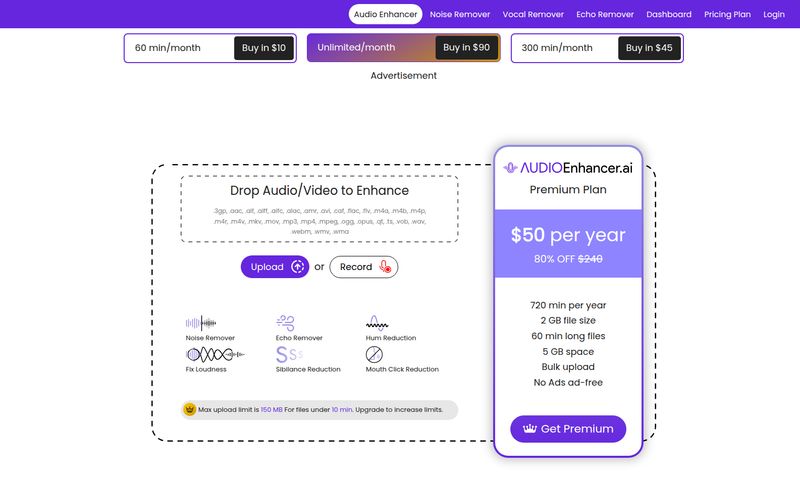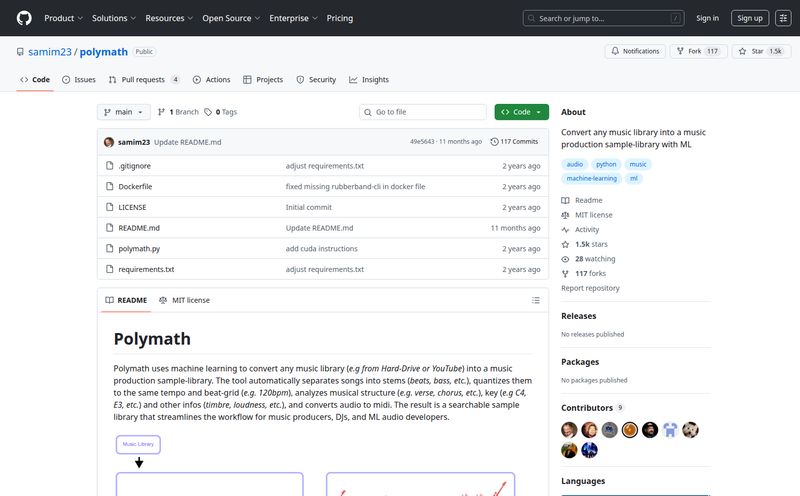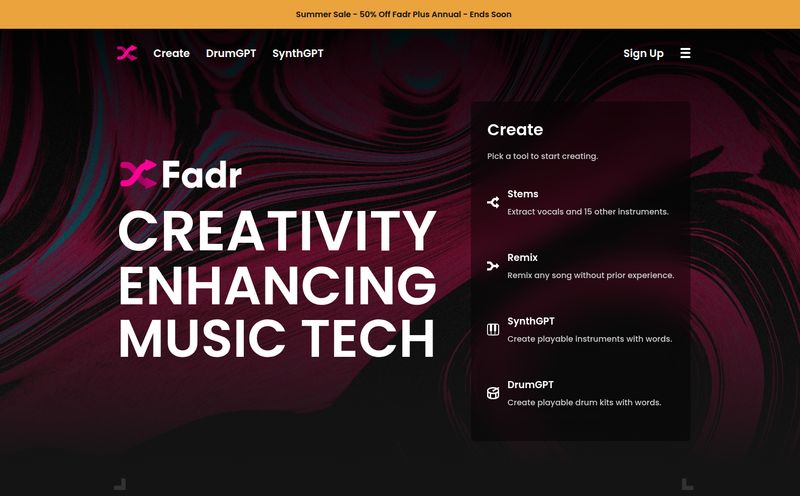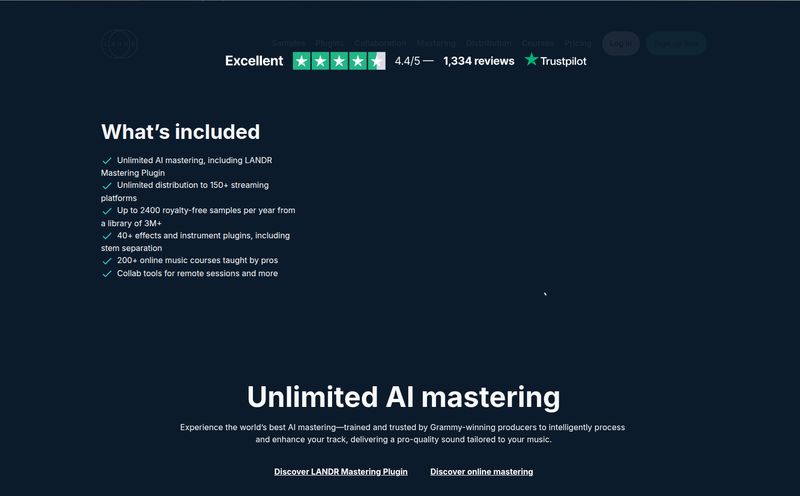I have a confession to make. I'm a chronic remixer. It's a problem. I’ll hear a great vocal line in a pop song and immediately my brain starts layering it over a completely different beat. For years, this meant spending hours on forums, digging through sketchy-looking websites, or trying to DIY an instrumental with clumsy EQ tricks. The results? Mostly a muddy, phased-out mess that sounded like the singer was trapped in a fishbowl.
We've all been there, right? You need an instrumental for a karaoke night, or you want to sample that killer bassline for a new track, but a clean version just doesn't exist. It’s the eternal struggle for anyone who plays with audio.
So, when I started seeing a new wave of AI-powered audio separation tools pop up, my interest was definitely piqued. One that kept crossing my radar was Remover.studio. The name is straightforward enough. But the promise—cleanly separating a song into its core components with a few clicks—seemed a little too good to be true. I had to see for myself.
So, What Exactly is Remover.studio?
In short, Remover.studio is an AI tool that acts like a digital audio scalpel. You feed it a fully mixed song, and its algorithm intelligently separates it into individual tracks, or 'stems'. The main splits are typically vocals, bass, drums, and 'other' (which usually catches guitars, synths, and pianos).
This isn’t just for nerds like me trying to make bootleg remixes. It’s designed for a whole range of people: DJs who want to create unique mashups on the fly, music producers looking for clean samples, and—let's be honest, probably its biggest audience—karaoke enthusiasts who want an instrumental version of literally any song. No more waiting for the official karaoke version to be released!
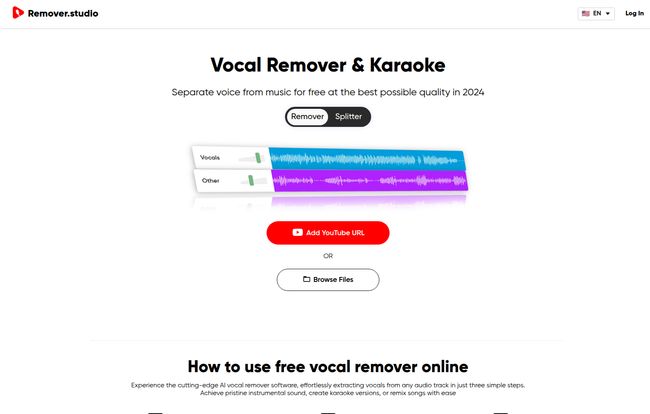
Visit Remover.studio
Getting Started: The First-Time User Experience
First impressions matter, and the team behind Remover.studio clearly gets that. The homepage is clean, no-nonsense, and gets straight to the point. You're met with two main options: 'Browse Files' to upload an audio file (it handles MP3, WAV, FLAC, and others) or a box to paste an 'Add YouTube URL'. That YouTube feature is a game-changer, I have to say.
The process is genuinely as simple as they claim:
- Upload: You either drag and drop your file or paste the YouTube link.
- Process: The AI takes over. It analyzes the track and does its separation magic. This usually takes a minute or two, depending on the song's length. A good time to grab a coffee.
- Download: You're presented with the separated stems. You can listen to each part, adjust the volume, and then download what you need. A full instrumental? Just mute the vocal track. An acapella? Mute everything else. Simple.
The interface is intuitive. You don’t need a degree in audio engineering to figure it out, which is a massive plus. It feels less like a complex piece of studio software and more like a user-friendly web app. Which, it is.
The Standout Features Under the Hood
Okay, it's easy to use. But does it work? Let's break down what it's actually doing.
The Quality of the AI Stem Separation
This is the make-or-break feature. If the separation is bad, nothing else matters. I threw a few challenging tracks at it—a dense classic rock song, a modern pop track with heavy vocal effects, and an older jazz recording. I was genuinely impressed. The vocal separation is surprisingly clean on most modern productions. You'll get a very usable acapella with minimal 'bleeding' from other instruments.
Is it perfect? No. On really complex or lo-fi tracks, you might hear some slight digital artifacts—a little bit of a ghostly hi-hat in the vocal track, or a faint vocal echo in the instrumental. Some people call this 'AI ghosting'. But for 90% of use cases, the quality is more than good enough, especially when you consider it’s happening in minutes. It's a huge leap from the old-school methods I used to wrestle with.
Your Personal Karaoke Machine
The karaoke angle is a big selling point. Not only can you create the instrumental track, but the platform also displays the song's lyrics, synced up with the music. It essentially turns any song on YouTube into a karaoke-ready experience. This is brilliant for parties or just for practicing your singing. The fact that it can pull this off for obscure songs that would never get an official karaoke release is fantastic.
Let's Talk About the Price Tag: Remover.studio's Plans
Ah, the all-important question of cost. This is an area where I think Remover.studio gets it really right by offering a ton of flexibility. There isn’t a one-size-fits-all approach here.
| Plan | Cost | Best For |
|---|---|---|
| Free Forever | $0.00 / Month | The curious user. You get 1 song per day (max 8 minutes) at high quality. Perfect for testing it out or occasional one-offs. |
| Subscription | $7.99 / Month | The power user. Unlimited songs (max 30 minutes), 'very high' quality, and full features. Ideal for DJs, producers, and serious karaoke hosts. |
| One-Time Payment | Starts at $3.99/song, down to $1.19/song for a 50-song pack. | The project-based user. If you just need a handful of songs for a specific project and don't want a recurring subscription, this is the way to go. |
I really appreciate this model. The free plan is genuinely useful, and the one-time payment options are perfect for people like me who might go months without needing the service and then suddenly need to process 10 songs in a week for a project.
The Honest Truth: Pros and Cons
No tool is perfect, and a good review has to be balanced. After spending a good bit of time with Remover.studio, here's my honest breakdown.
What I Absolutely Loved
The quality-to-convenience ratio is off the charts. Getting stems this clean this quickly would have been science fiction a few years ago. The user interface is genuinely a joy to use; it's clean, fast, and idiot-proof. The YouTube integration is a killer feature that I found myself using constantly. And, as mentioned, the flexible pricing means you're not locked into a subscription you dont need.
Where It Has Room to Grow
Let's be real. The free plan is great for a taste, but one song per day feels a bit restrictive if you're in a creative flow. The processing time, while generally fast, can feel like an eternity when you're excited to hear the result—it can take up to 3 minutes for a longer song. And yes, the dreaded AI splitting errors do happen. It’s not common, but on certain tracks, you'll get that slight, watery artifacting. It’s a limitation of the current AI tech across the board, not just a Remover.studio problem, but it’s something to be aware of.
So, Who is Remover.studio Really Built For?
While the marketing might lean towards karaoke, the applications are much broader. I see three main groups getting a ton of value here:
- Music Producers & DJs: This is a sampling goldmine. Being able to easily grab an acapella or a drum break without hunting for official stems is incredible. For live DJs, it opens up a world of real-time mashups and creative blends.
- Karaoke & Cover Artists: This one's obvious. You have a nearly infinite library of backing tracks at your fingertips. It’s perfect for singers who want to create their own covers for YouTube or practice over a professional backing track.
- Music Students & Teachers: Want to analyze a complex bassline by a master like James Jamerson? Isolate it. Want to hear exactly what the harmony vocals are doing in a Queen song? Isolate them. It's an incredible ear-training and music analysis tool.
It’s also worth noting how it fits into the larger ecosystem. Tools like LALAL.AI and Moises offer similar services, and each has its own strengths. Some might argue one has slightly better algorithms for certain genres, while another has a better mobile app. But from what I've seen, Remover.studio competes strongly on ease of use, its direct YouTube functionality, and its very attractive pricing flexibility.
Frequently Asked Questions (The Stuff You're Probably Wondering)
- Is Remover.studio actually free?
- Yes, there is a 'Free Forever' plan. It lets you process one song per day, up to 8 minutes long. It's a great way to try the service without spending a dime.
- What kind of audio files can I upload?
- It supports the most common formats, including MP3, WAV, and FLAC. Plus, you can just paste a link from YouTube, which is often easier.
- How good is the final audio quality?
- It's very good, especially for an automated AI tool. The paid plans offer a 'Very High' quality setting that sounds great. You might notice tiny artifacts on very complex songs, but for most purposes, it's excellent.
- Can I really use any song from YouTube?
- Pretty much, yes. As long as the video is public and contains music, you can paste the URL and the tool will do its best to process it. Just be mindful of copyright if you plan to use the output publicly.
- How long does it take to process a song?
- It depends on the server load and the length of the song, but it typically takes between 1 to 3 minutes.
My Final Verdict: Is Remover.studio Worth a Shot?
Absolutely. For me, it has solved a problem that has plagued my creative process for years. The ability to quickly and cleanly deconstruct a piece of audio is nothing short of magic.
It strikes a fantastic balance between power, simplicity, and affordability. While it may not be the 100% perfect, flawless solution for every single audio file on the planet, it gets incredibly close. It's turned a once-tedious technical challenge into a simple, two-minute task. Whether you're a serious music producer or just someone who wants to belt out a tune at your next party, Remover.studio is a seriously impressive tool that's well worth checking out. It’s earned a permanent spot in my digital toolbox.
References and Sources
- Remover.studio Official Website
- Remover.studio Pricing and Registration
- LALAL.AI (Competitor)
- Moises (Competitor)
